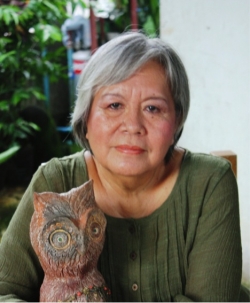1
Strange by village ways, the woman your mother.
Her rice boils over and spills on the fire;
she forgets the cooking pot till the grain turns
black and bitter at the bottom—then no one can eat
the rice but the always hungry ducks. What good
will ever come out of you, the other women say.
Her mother's fingers sting her thighs,
but does she mind?
Oh, she minds the singing fire,
water in the deep dark well with a piece of sky
fallen into it, the gritty grain in her hands,
the sooty earthen pot. She minds their uses
and our needs. But what to do when the trees
keep talking, talking to her, and the breeze
passing by is full of their whispers?
The woman your mother, she alone hears
the lone macopa in the yard sighing as it sheds
the purple threads of its blossoms on the grass in April,
grunting a little as red hearts of her fruit weigh down
her branches. She hears the trees in the far mountains
rubbing, rubbing their leaves in joy of the rain.
The wood fire crackles, Tell them, tell them, tell them.
The stew overflows, the kitchen fills with smoke
as she listens, shaping words in her head.
On the third year of her moon flow, the man your father
comes and asks for her, not minding what anyone
is saying about her, the burnt pot, the smoky fire,
the far gaze to mountains that no woman in the village
dares to do. For he too, like her, has the trees in his mind,
in his sight trees filling whole mountainsides, tall wood
reaching high for the sky, trees branching over his head,
their leaves his shelter, his bed, and in his pockets, seeds
throbbing for a bed in the millennial earth in which
he roots them, earth on which he sets his own feet daily
till the ripeness of the years.
And so it goes,
on and on to this time, and now the old bones rest
among the trees. As you can see, this is all so very long ago.
2
So very long ago. And so it goes.
The woman your mother, great listener
and teller of tales, and the sower of seeds,
the man your father, they say, "Every tree
in this land hosts a secret dweller."
Their bones are now silt in the flood
but their words stay. So now in the village,
trees are stories told by women
dandling their babes at the knees,
"Now, little ducklings, sleep in peace.
Tall trees are watching you.
Taghoy, invisible dweller of trees,
guards the green river, the caves in the hills,
the road to the village, Taghoy watching
from his home in the tall trees,
Taghoy sending you dreams."
The pots sizzle, the women feed the fire
with raw kindling, singing all the while,
"Sleep, my little duckling, do not cry.
Trees are watching you day and night."
Smoke from raw wood stings your eyes.
Do you remember, do you believe?
Women breathe on the embers,
the blaze leaps high. In our village,
the tree stories live.
3
In the village, dwellings rise on round timber,
trunks of old trees, straight and tapered;
with their barks peeled off, or gnarled by wind
and inclement seasons, they writhe upward
in agony or grace, to hold up roof walls windows,
doors to let in or let out, claiming space for shelter,
comfort, safety, even love—all we ever need in this world—
says the woman your mother (and hence,
all women thereafter). On the day they fell trees
for the posts, the roof beams, the joists, the lintels,
the floors, a great outcry rose from the orphaned
tree dwellers.
Take a rope of hemp then, says the man your father,
and bind the wood tight a hundred times around
or more. To keep the taghoy inside their homes,
the taghoy prowling unseen within the bole,
says the woman your mother, who hears as no other,
the tribulation of trees missing leaf and bloom,
longing for rain, sun, the owl among its branches,
the stars and the moon, wind ruffling its leaves.
Bind the rope tight around the wood, hope the taghoy
stays inside and does not fill the house with his lament.
Build your fire with kindling from the generous tree,
but leave the living one alone.
Says the man your father,
For every tree you fell, seed a hundred in return—
to guard the mountains, house a kindly spirit,
make a home for invisible friends.
For its life, your act of gratitude.
4
When setting off on a journey,
do this: Two open palms lay
on the rough bark of a tree
and convey your fears to it—
danger in the road ahead,
worry for those who are left.
When you return, if all goes well,
the tree will still be there,
shaking its bright boughs
to welcome you home.
Says the woman your mother
(and hence all women who come
after her),
Trees will take your death as its own.
It will pay its own life as ransom
for your safe return.
Believe, and go your way in peace.
